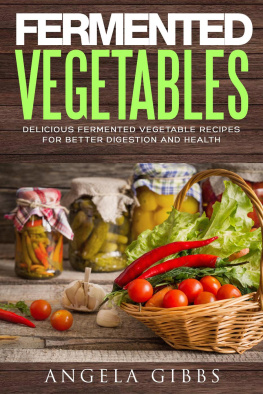Fermented Vegetables
Delicious Fermented Vegetable Recipes for Better Digestion and Health
Angela Gibbs
Text Copyright 2018 by Angela Gibbs - All rights reserved.
This document is geared towards providing exact and reliable information in regards to the topic and issue covered. The publication is sold with the idea that the publisher is not required to render accounting, officially permitted, or otherwise, qualified services. If advice is necessary, legal or professional, a practiced individual in the profession should be ordered.
From a Declaration of Principles which was accepted and approved equally by a Committee of the American Bar Association and a Committee of Publishers and Associations.
In no way is it legal to reproduce, duplicate, or transmit any part of this document in either electronic means or in printed format. Recording of this publication is strictly prohibited and any storage of this document is not allowed unless with written permission from the publisher. All rights reserved.
The information provided herein is stated to be truthful and consistent, in that any liability, in terms of inattention or otherwise, by any usage or abuse of any policies, processes, or directions contained within is the solitary and utter responsibility of the recipient reader. Under no circumstances will any legal responsibility or blame be held against the publisher for any reparation, damages, or monetary loss due to the information herein, either directly or indirectly.
Respective authors own all copyrights not held by the publisher.
The information herein is offered for informational purposes solely, and is universal as so. The presentation of the information is without contract or any type of guarantee assurance.
The trademarks that are used are without any consent, and the publication of the trademark is without permission or backing by the trademark owner. All trademarks and brands within this book are for clarifying purposes only and are owned by the owners themselves, not affiliated with this document.
Table of Contents
T hey may have a pungent taste and smell, but the health and wellness benefits of fermented vegetables simply cannot be overlooked. These tasty albeit intense treats can make you look and feel better, and are incredibly easy to produce right at home. If you have a surplus of produce from the garden this summer, consider pickling some of the leftovers. Vegetables are low in acid, unlike fruits. This can create a situation where the veggies are more likely to deteriorate before they can be eaten or processed, so fermentation helps them stick around a little longer.
Fermented foods are those that have undergone the process of lactofermentation. Simply put, lactofermentation is when certain types of bacteria feed, and consequently multiply, on the starches and sugars in foods. This process allows the food to be preserved, and also creates several nutritious byproducts, such as B vitamins, essential fatty acids, probiotics, and helpful enzymes.
F ermentation was originally used as a way to preserve food. Ancient civilizations without the benefit of cold storage needed to keep the food they harvested for as long as possible. Anthropologists tell us that the first fermented foods that humans consumed were likely fruits. Once alcohol was discovered as a way to preserve food, bread making and fermentation really gained popularity. The first place that vegetables were fermented was probably China. They developed molds that were used to keep vegetables from rotting too soon to be enjoyed.
The process of fermenting food has undergone many changes throughout cultures and historical periods. However, it is something that has primarily been passed down from generation to generation and from older family members to younger. Cooking and food preparation is an important part of community and family bonds. So while there might not be history books written about food fermentation, it's a skill and a process that has been shared over the last hundreds and even thousands of years. It is traditional.
F ermented foods are high in probiotics. Probiotics help to regulate your gastrointestinal health, protecting against bloat, constipation, and other digestive problems. In addition, because your gut contains more than 70 percent of your immune system, maintaining a healthy GI tract can help reduce the number of colds and other illnesses you pick up.
Having the right balance of bacteria in your GI tract will also help you digest food more effectively. Through the process of digestion, it is common for many crucial nutrients to be lost. However, the bacteria in your gut can do a lot of this work for you. By consuming fermented foods with high levels of probiotics, you won't need to rely on multivitamins or other supplements.
This can save you money in the long run, as it is more difficult for your body to absorb nutrients in pill vitamin-form than it is in its natural fermented state. Fermented vegetables can be inexpensive or free to make, especially if you use produce from your own garden. You can choose any kind of vegetable you like, or have an overabundance of, and can add them to salads, eat them as snacks, or include them in a wide variety of culinary options.
Consuming fermented foods can also help eliminate cravings for unhealthy foods, such as sugar and refined carbohydrates. Bacteria feed on sugars, so regulating your internal microbiome can help your digestive bacteria adapt to a healthier diet.
Next page













